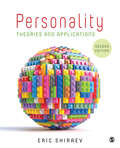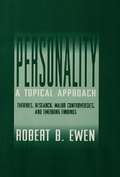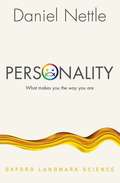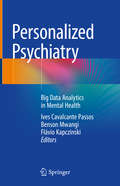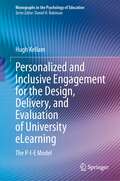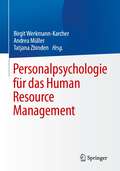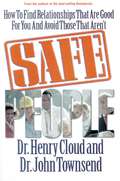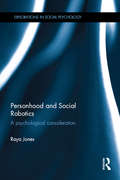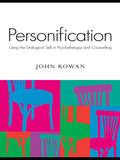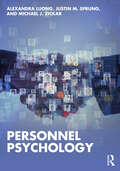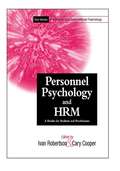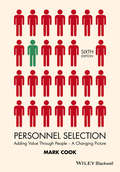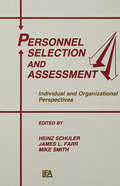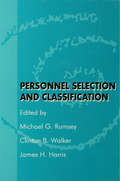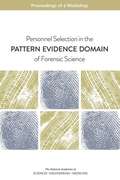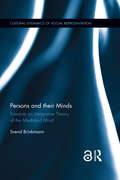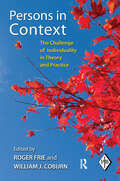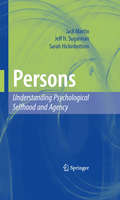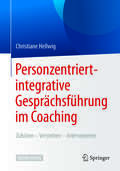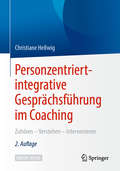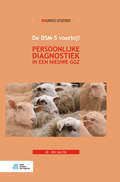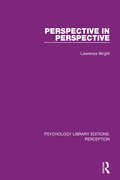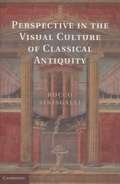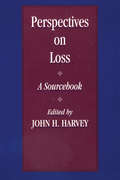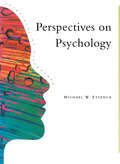- Table View
- List View
Personality: Theories and Applications
by Eric ShiraevPersonality: Theories and Applications takes an interdisciplinary and cross-cultural approach to the study of personality. Author Eric Shiraev structures the text around three questions: What are the basic ideas and facts that we focus on? How do we study these ideas and facts? How do we apply them? Students will benefit from a deeper understanding of personality as they navigate a wide range of theories, empirical studies, and thought-provoking exercises, fostering enhanced critical thinking and knowledge. The Second Edition includes a new chapter on the digital domain of personality, incorporates the latest findings from the fields of behavioral economics and neuroscience, and offers expanded coverage of LGBTQ+ issues, including prejudice and cultural stereotypes. Included with this title: LMS Cartridge: Import this title’s instructor resources into your school’s learning management system (LMS) and save time. Don’t use an LMS? You can still access all of the same online resources for this title via the password-protected Instructor Resource Site.
Personality: Theories, Research, Major Controversies, and Emerging Findings
by Robert B. EwenMany texts attempt to bridge theory and research. They include one or two pages dealing with important theorists--Jung, Adler, Freud, et al.--inserted into chapters focused on academic studies. In most cases, the discussion fails to do justice to the theorists and the relationship between the ideas and the empirical work is often tenuous at best. This book takes a different approach. An alternative to Ewen's An Introduction to Theories of Personality, this book features a chapter on each major type of theory followed by a separate chapter reviewing the relevant research, controversies, and emerging findings. Although it incorporates material from the previous text, there are substantial differences. Personality: A Topical Approach devotes more attention to psychological research, and considerably less attention to the more minor and abstruse aspects of various theories. Chapters are devoted to the following theories: *pychoanalytically-oriented, *tait, *cgnitive, *self-humanistic, and *behaviorism. While the book emphasizes major research foci (the Big Five personality factors, self-efficacy, self-esteem, and more), it also includes a chapter on research methods and coverage of issues often omitted from other texts such as dream interpretation, cognitions and the Holocaust, scientific inquiry, and near-death experiences. The book also provides study questions, a "help" section, and a glossary.
Personality: What Makes You The Way You Are (Oxford Landmark Science)
by Daniel Nettle Sioned DaviesIt is one of the great mysteries of human nature. Why are some people worriers, and others wanderers? Why are some people so easy-going and laid-back, while others are always looking for a fight? Written by Daniel Nettle--author of the popular book Happiness--this brief volume takes the reader on an exhilarating tour of what modern science can tell us about human personality. Revealing that our personalities stem from our biological makeup, Nettle looks at the latest findings from genetics and brain science, and considers the evolutionary origins and consequences of different personalities. The heart of the book sheds light on the "big five": Extraversion, Neuroticism, Conscientious, Agreeableness, and Openness. Using a stimulating blend of true-life stories and scientific research, Nettle explains why we have something deep and consistent within us that determines the choices we make and situations we bring about. He addresses such questions as why members of the same family differ so markedly in their natures? What is the best personality to have--a bold one or a shy one, an aggressive one or a meek one? And are you stuck with your personality, or can you change it? Life, Nettle concludes, is partly the business of finding a niche where your personality works for you. "It is a question of choosing the right pond," he notes, "and being mindful of the dangers." There is no ideal personality to have. Every disposition brings both advantages and disadvantages. Full of human wisdom as well as scientific insight, this book illuminates the pluses and minuses of personality, offering practical advice about living with the nature you were born with. It even includes a questionnaire so that you can assess yourself.
Personalized Psychiatry: Big Data Analytics in Mental Health
by Ives Cavalcante Passos Benson Mwangi Flávio KapczinskiThis book integrates the concepts of big data analytics into mental health practice and research.Mental disorders represent a public health challenge of staggering proportions. According to the most recent Global Burden of Disease study, psychiatric disorders constitute the leading cause of years lost to disability. The high morbidity and mortality related to these conditions are proportional to the potential for overall health gains if mental disorders can be more effectively diagnosed and treated. In order to fill these gaps, analysis in science, industry, and government seeks to use big data for a variety of problems, including clinical outcomes and diagnosis in psychiatry. Multiple mental healthcare providers and research laboratories are increasingly using large data sets to fulfill their mission. Briefly, big data is characterized by high volume, high velocity, variety and veracity of information, and to be useful it must be analyzed, interpreted, and acted upon. As such, focus has to shift to new analytical tools from the field of machine learning that will be critical for anyone practicing medicine, psychiatry and behavioral sciences in the 21st century. Big data analytics is gaining traction in psychiatric research, being used to provide predictive models for both clinical practice and public health systems. As compared with traditional statistical methods that provide primarily average group-level results, big data analytics allows predictions and stratification of clinical outcomes at an individual subject level.Personalized Psychiatry – Big Data Analytics in Mental Health provides a unique opportunity to showcase innovative solutions tackling complex problems in mental health using big data and machine learning. It represents an interesting platform to work with key opinion leaders to document current achievements, introduce new concepts as well as project the future role of big data and machine learning in mental health.
Personalized and Inclusive Engagement for the Design, Delivery, and Evaluation of University eLearning: The P-I-E Model (Monographs in the Psychology of Education)
by Hugh KellamThe book examines the intersections of online learning theories and models in the current research literature for teaching in digital environments in postsecondary education. It describes the connection between eLearning theory and practice to develop a pragmatic and adaptable model for the design, development, and implementation of interactive, personalized, and inclusive online learning experiences. The book discusses a model with three themes – personalization, inclusiveness, engagement (the P-I-E model) – that describe facilitation techniques, instructional design methods and evaluation tools to customize eLearning for higher education students. It offers theoretical underpinnings, implementation tips, a design checklist and evaluation questions for each of the model’s sections. In addition, the book presents an implementation plan for the elements of the model based on principles of change management and program planning. The volume can be used as either a comprehensive system to design an entire online course or as a reference guide to improve selected components of an existing program.Key areas of coverage include:Review of eLearning theories.Examination of the characteristics of individual learners, professors, and class communities in online environments.Recommendations for instructional design, assessment, and evaluation for online students.Best practices for learner engagement including scheduling, communication, and user interface design.Program implementation strategies and evaluation questions for all sections of the P-I-E model.Personalized and Inclusive Engagement for the Design, Delivery, and Evaluation of University eLearning is an essential resource for instructional designers, college instructors, and university professors to create, implement, evaluate, and improve personalized and inclusive learning for postsecondary students.
Personalpsychologie für das Human Resource Management
by Birgit Werkmann-Karcher Andrea Müller Tatjana ZbindenDieses Buch hilft Personalmanager:innen und Führungskräften dabei, die komplexen Aufgaben des Human Resource Managements im Zeichen der Arbeit 4.0 zu bewältigen. Für die Kernaufgaben der Personalarbeit bietet es einen hilfreich strukturierten Überblick mit aktuellen wissenschaftlich basierten Empfehlungen aus der Angewandten Psychologie zu Themen wie z. B.: Employer Branding und Personalmarketing, Kompetenz- und Potentialdiagnostik, Leistungssteuerung, Lernen und Laufbahnen in Organisationen, Team-, Organisations- und Kulturentwicklung. Neben HR-Grundlagen zu Rollen, Geschäftsmodellen und Personal der Zukunft bietet das Buch Tipps, Methoden und Checklisten für aktuelle Themen wie die Gestaltung hybrider Arbeit, Agilität und neue Formen von Führung, People Analytics und Green HRM.
Personas Seguras: Como encontrar relaciones que le sean provechosas y evadir las que no lo son
by John D. Townsend Henry CloudPersonas Seguras le ayudará a reconsiderar su forma de iniciar relaciones. Basta ya de fracasos. Comience a disfrutar las relaciones saludables y balanceadas que todos queremos y necesitamos. <P><P> ¿HA ENTREGADO ALGUNA VEZ LO MEJORY H RECIBIDO A CAMBIO LO PEOR?Las heridas producidas por personas > pueden ser penetrantes. Si ha tenido relaciones que se han aprovechado de usted, si han abusado de usted o lo han abandonado, tiene que leer Personas Seguras. Lo ayudará a tomar decisiones sabias lo mismo en cuanto a amistades que a romances. Descubrirá que las personas buenas pueden enredarse con personas malas. Y aprenderá cómo no volver a repetir los errores anteriores y cómo no volver a repetir los errores anteriores y cómo escoger personas seguras y saludables para establecer amistad o estar acompañado. Los doctores Cloud Townsend presentan opiniones expertas que lo ayudarán a: <br>• Corregir cosas en usted que pueden poner en peligro la seguridad de sus relaciones. <br>• Conocer los veinte rasgos de las personas que no son dignas de confianza <br>• Reconocer qué hace digna de confianza a una persona <br>• Evitar las relaciones enfermizas <br>• Establecer relaciones positivas <br>• Ser usted una persona segura <P>Personas Seguras le ayudará a reconsiderar su forma de iniciar relaciones. Basta ya de fracasos. Comience a disfrutar las relaciones saludables y balanceadas que todos queremos y necesitamos.
Personhood and Social Robotics: A psychological consideration (Explorations in Social Psychology)
by Raya A JonesAn exponentially growing industry, human robot interaction (HRI) research has drawn predominantly upon psychologists’ descriptions of mechanisms of face-to-face dyadic interactions. This book considers how social robotics is beginning unwittingly to confront an impasse that has been a perennial dilemma for psychology, associated with the historical ‘science vs. art’ debate. Raya Jones examines these paradigmatic tensions, and, in tandem, considers ways in which the technology-centred discourse both reflects and impacts upon understanding our relational nature. Chapters in the book explore not only how the technology-centred discourse constructs machines as us, but also how humans feature in this discourse. Focusing on how the social interaction is conceptualised when the human-robot interaction is discussed, this book addresses issues such as the long-term impact on persons and society, authenticity of relationships, and challenges to notions of personhood. By leaving aside terminological issues, Jones attempts to transcend ritual of pitching theories against each other in order to comprehensively analyse terms such as subjectivity, self and personhood and their fluid interplay in the world that we inhabit. Personhood and Social Robotics will be a key text for postgraduate students, researchers and scholars interested in the connection between technology and human psychology, including psychologists, science and technology studies scholars, media studies scholars and humanists. The book will also be of interest to roboticists and HRI researchers, as well as those studying or working in areas of artificial intelligence and interactive technologies more generally.
Personification: Using the Dialogical Self in Psychotherapy and Counselling
by John RowanPersonification discusses the theory behind multiplicity of the person and considers the implications that the relationships between the different parts of the same person have in practice. Providing both historical and contemporary insights John Rowan reveals new thinking and research in the field, as well as offering guidelines for using this information in practice. The book also looks closely at the practice of personification – a technique involving the turning of a problem into a person and allowing a two-way dialogue through which the inner critic can be addressed and explored. As such areas of discussion include: the use of multiplicity in therapy group work and the dialogical self the transpersonal This practical, straightforward book will be ideal reading for anyone using personification in their therapeutic work, including psychotherapists, counsellors and coaches.
Personnel Psychology
by Michael J. Zickar Alexandra Luong Justin M. SprungAccessible and engaging, this textbook introduces students to the field of personnel psychology, also known as industrial psychology. Based on their years of teaching in this area, Luong, Sprung, and Zickar survey core topics in the field, including job analysis, recruitment, selection, assessment, and performance evaluation. Throughout, they emphasize a psychological – rather than management – approach, explaining the key psychological principles that underpin human resources practices. Supported by plentiful examples, review questions, and discussion questions, this comprehensive overview shows how personnel psychologists endeavor toward a better workplace. Written in a clear and captivating style, this book introduces students to the most recent and pertinent scientific research in personnel psychology, and inspires future study in industrial-organizational psychology and related fields.
Personnel Psychology and Human Resources Management: A Reader for Students and Practitioners (Key Issues in Industrial & Organizational Psychology)
by Cary L. Cooper Ivan T RobertsonPart of a three-volume set of books which are themed collections ofreprinted articles from the International Review of Industrial andOrganizational Psychology (IRIOP) from 1997-2001. Each volumeprovides collections around a topic area, with new introductionswritten by the editors for each volume. Written by leading scholarswith international reputations in their fields, this authoritativecollection provides a high quality, review that will be aninvaluable resource for students, researchers and practitioners. * Topic focussed, 'best of' collections on a specific themeconveniently incorporated into one book * Ideal for graduate study, dissertations, projects, seminars This volume covers key topics at the interface of human resourcemanagement (HRM) and Industrial/Organizational Psychology. Thechapters focus on the individual and are grouped into two sections:Personnel Psychology covering topics such as personnel selection,assessment, 360 degree feedback, assessment centres and cognitiveability testing and HRM which considers wider issues, includinglearning strategies, training, absence, turnover, commitment andthe psychological contract.
Personnel Selection
by Mark CookThis is a fully updated edition of Personnel Selection, a seminal text on the psychometric approach to personnel selection by a noted expert in the field. Focuses on cutting-edge topics including the influence of social networking sites, adverse impact, age differences and stereotypes, distribution of work performance, and the problems of selecting new employees using research based on incumbent employees Questions established beliefs in the field, especially issues that have been characterized as "not a problem," such as differential validity, over-reliance on self-report, and "faking good" Contains expanded discussion of research and practice in the US and internationally, while maintaining the definitive coverage of UK and European selection approaches Provides comprehensive yet accessible information for professionals and students, as well as helpful pedagogical tools (technical and statistical boxes, simplified figures and tables, research agenda boxes, key point summaries, and key references)
Personnel Selection and Assessment: Individual and Organizational Perspectives (Applied Psychology Series)
by Mike Smith James L. Farr Heinz SchulerThe impetus for this volume came from the editors' belief that most current research and thinking about personnel selection and assessment in organizations considered only the perspective of the employer. The job applicant seeking to join the organization or the employee being considered for promotion or reassignment was typically given little attention from the designers of employment or assessment systems. They believed that this imbalance had several negative implications: 1. Organizational selection and assessment appeared to be the principal area within work and organizational psychology that had forgotten a basic tenet of the profession of psychology, namely, that the welfare of the individual is paramount. 2. A lack of concern for the individuals who were being assessed could result in additional criticisms of psychological assessment in employment settings. 3. The acceptability of selection and assessment devices and systems may impact in (largely) unknown ways on the decisions of individuals to apply for jobs or transfers, thus affecting the selection ratio and potential utility of such systems. 4. Individual reactions to the characteristics of assessment and selection devices could affect the accuracy of the information obtained about those individuals, adversely affecting the reliability and validity of resulting personnel decisions. Informally discussing these concerns with their professional colleagues, the editors found that others were similarly troubled. Their next response was to organize a three day conference bringing together a number of researchers in applied psychology to present papers and participate in discussions related to balancing individual and organizational needs in selection and assessment. Revisions of the papers presented at this conference form the core of this volume.
Personnel Selection and Classification
by Michael G. Rumsey Clinton B. Walker James H. HarrisBringing together several key elements needed to identify the most promising themes for future research in selection and classification, this book's underlying aim is to improve job performance by selecting the right persons and matching them most effectively with the right jobs. An emphasis is placed on current, innovative research approaches which in some cases depart substantially from traditional approaches. The contributors -- consisting of professionals in measurement, personnel research, and applied and military psychology -- discuss where the quantum advances of the last decade should take us further. Comprehensive coverage of the selection and classification domain is provided, including a broad range of topics in each of the following areas: performance conceptualization and measurement, individual differences, and selection and classification decision models. The presentations in each of these areas are integrated into a set of coherent themes. This integration was the product of structured group discussions which also resulted in a further evolution of some of the ideas presented.
Personnel Selection in the Pattern Evidence Domain of Forensic Science: Proceedings of a Workshop
by Engineering Medicine National Academies of SciencesIn July 2016 The National Academies of Sciences, Engineering, and Medicine convened a workshop with the goal of bringing together industrial and organizational (I-O) psychologists, experts on personnel selection and testing, forensic scientists, and other researchers whose work has a nexus with workforce needs in the forensic science field with a focus on pattern evidence. Participants reviewed the current status of selection and training of forensic scientists who specialize in pattern evidence and discussed how tools used in I-O psychology to understand elements of a task and measure aptitude and performance could address challenges in the pattern evidence domain of the forensic sciences. This publication summarizes the presentations and discussions from the workshop.
Persons and their Minds: Towards an Integrative Theory of the Mediated Mind (Cultural Dynamics of Social Representation)
by Svend BrinkmannToday’s approaches to the study of the human mind are divided into seemingly opposed camps. On one side we find the neurosciences, with their more or less reductionist research programs, and on the other side we find the cultural and discursive approaches, with their frequent neglect of the material sides of human life. Persons and their Minds seeks to develop an integrative theory of the mind with room for both brain and culture. Brinkmann’s remarkable and thought-provoking work is one of the first books to integrate brain research with phenomenology, social practice studies and actor-network theory, all of which are held together by the concept of the person. Brinkmann’s new and informative approach to the person, the mind and mental disorder give this book a wide scope. The author uses Rom Harré’s hybrid psychology as a meta-theoretical starting point and expands this significantly by including four sources of mediators: the brain, the body, social practices and technological artefacts. The author draws on findings from cultural psychology and argues that the mind is normative in the sense that mental processes do not simply happen, but can be done more or less well, and thus are subject to normative appraisal. In addition to informative theoretical discussions, this book includes a number of detailed case studies, including a study of ADHD from the integrated perspective. Consequently, the book will be of great interest to academics and researchers in the fields of psychology, philosophy, sociology and psychiatry.
Persons in Context: The Challenge of Individuality in Theory and Practice (Psychoanalytic Inquiry Book Series)
by Roger FrieIn contemporary forms of psychoanalysis, particularly intersubjective systems theory, the turn towards contextualism has permitted the development of new ways of thinking and practicing that have dispensed with the notion of isolated individuality. For many who embrace this "post-subjectivist" way of thinking and practicing, the recognition that all human experience is fundamentally immersed in the world makes the question of individuality seem confusing, even anachronistic. Yet the challenge of individuality remains an important and pressing issue for contemporary theory and practice; many clinicians are left to wonder about the role of "individual" experience and how to approach it conceptually or clinically. This volume of original essays gives the problem of individuality its due, without losing sight of the importance of contextualized experience. Drawing on a variety of disciplinary backgrounds - philosophical, developmental, biological, and neuroscientific - the contributors address the tension that exists between individuality and the emergence of contextualism as a dominant mode of psychoanalytic theory and practice, thereby providing unique insights into the role and place of individuality both in and out of the clinical setting. Ultimately, these essays demonstrate that individuality, no matter how it may be defined, always occurs within a contextual web that forms the basis of human experience. Contributors: William J. Coburn, Philip Cushman, James L. Fosshage, Roger Frie, Frank M. Lachmann, Jack Martin, Donna Orange, Robert D. Stolorow, Jeff Sugarman
Persons: Understanding Psychological Selfhood and Agency
by Jack Martin Sarah Hickinbottom Jeff H. SugarmanAt its core, psychology is about persons: their thinking, their problems, the improvement of their lives. The understanding of persons is crucial to the discipline. But according to this provocative new book, between current essentialist theories that rely on biological models, and constructionist approaches based on sociocultural experience, the concept of the person has all but vanished from psychology. Persons: Understanding Psychological Selfhood and Agency recasts theories of mind, behavior, and self, synthesizing a range of psychologists and philosophers to restore the centrality of personhood--especially the ability to make choices and decisions--to the discipline. The authors' unique perspective de-emphasizes method and formula in favor of moral agency and life experience, reveals frequently overlooked contributions of psychology to the study of individuals and groups, and traces traditions of selfhood and personhood theory, including: The pre-psychological history of personhood, a developmental theory of situated, agentive personhood, the political disposition of self as a kind of understanding, Human agency as a condition of personhood, Emergentist theories in psychology, the development of the perspectival self. Persons represents an intriguing new path in the study of the human condition in our globalizing world. Researchers in developmental, social, and clinical psychology as well as social science philosophers will find in these pages profound implications not only for psychology but also for education, politics, and ethics.
Personzentriert-integrative Gesprächsführung im Coaching
by Christiane HellwigDieses Fachbuch für Coaches vermittelt sehr praxisnah Techniken der Gesprächsführung im Coaching, indem es die Ansätze und Haltungen humanistischer, systemischer und verhaltenspsychologischer Theorien auf verständliche Weise integriert. Nach Vermittlung der Grundlagen werden praktische Tipps und Methoden behandelt – von der Beziehungsgestaltung und personzentrierten Gesprächsführungstechniken über die Gestaltarbeit, Integration des körperlichen Erlebens, die Arbeit mit Systemen bis hin zu Perspektiven aus der Psychoanalyse und dem Umgang mit schwierigen Situationen.
Personzentriert-integrative Gesprächsführung im Coaching: Zuhören – Verstehen – Intervenieren
by Christiane HellwigDieses Fachbuch vermittelt sehr praxisnah die Haltung und Techniken der personzentriert-integrativen Gesprächsführung. Dazu werden zunächst das humanistische Menschenbild und die personzentrierte Persönlichkeitstheorie sowie die psychologischen Konzepte aus den integrierten Verfahren vorgestellt. Die Leitfrage lautet: Wie funktioniert personzentrierte Unterstützung im Coaching und wie kann diese erlernt werden? Dabei stützen sich die meisten Coaching-Konzepte auf eine Sammlung verschiedener Techniken ohne einheitliches Fundament. Personzentriert-integratives Coaching verbindet den, in seiner Wirksamkeit nachgewiesenen, Personzentrierten Ansatz mit coachingrelevanten, integrativen Methoden. Die Verbindung der Beziehungsgestaltung mit Techniken und Methoden werden, im Zusammenhang mit Möglichkeiten der Problemklärung und Lösungsfindungsunterstützung, aufgeführt.
Persoonlijke diagnostiek in een nieuwe ggz: Persoonlijke diagnostiek in een nieuwe ggz
by Jim OsDit boek is een pleidooi voor persoonlijke diagnostiek. Zonder standaard vragenlijstjes, met 100 procent aandacht voor de patiënt. Persoonlijke diagnostiek gaat uit van een participerende patiënt die zijn eigen diagnostische data verzamelt en meeneemt naar de professional. Zelfrapportage dus, in het dagelijks leven en met behulp van een slimme app. Zo krijgt de behandelaar zicht op de persoonlijke ervaringsnetwerken van zijn patiënt. Dat is de eerste stap naar herstel, want in die netwerken liggen weerbaarheid én kwetsbaarheid besloten. De DSM-5 voorbij! helpt hulpverleners om de specifieke problematiek van individuele patiënten boven water te krijgen. Met het internationale classificatiesysteem DSM-5 lukt dat vaak niet, door de eenzijdige toetsing op globale criteria. Patiënten met ernstige problematiek blijven daardoor vaak in de kou staan. Binnen de huidige ggz-organisatie komen hulpverleners niet ver met persoonlijke diagnostiek. Met name regelgeving en lopende afspraken met de zorgverzekaars staan in de weg. Daarom stelt dit boek de bijdrage van DSM-5 aan het kapitalistische ‘spel’ tussen farmaceuten, psychiaters, verzekeraars en politici ter discussie. En ontvouwt Van Os tegelijk een blauwdruk voor een nieuw soort ggz.
Perspective in Perspective (Psychology Library Editions: Perception #35)
by Lawrence WrightOriginally published in 1983, this book is about the way we see things – or think we do, which is by no means the same – and about the ways in which we have tried to reproduce that visual concept in diagrams, pictures, photographs, films and television. Whatever the medium, if any degree of realism is intended, some use of perspective is inevitable, and some understanding of it can aid the appreciation of the result. But here the technicalities of perspective geometry are treated as far as possible non-technically, by a common-sense approach. Students, would-be artists or architects, are warned in the Preface that they will travel second-class in the author’s train of thought (the ‘general reader’ coming first), but they may well find the journey worthwhile in that it provides a background to a subsequent, more detailed studies. Lawrence Wright shows that every form of perspective representation has some innate falsity, but that most such forms offer an adequate makeshift; that rules of geometry often need to be bent; that labour-saving dodges and shortcuts exist. As he says, perspective drawing, like politics, is an art of the possible. In reading this book, beginners may find it all simpler than they had supposed, though the established expert may in some interesting respects find just the opposite. The general reader may thereafter find himself seeing things – and representations of them – in a new light.
Perspective in the Visual Culture of Classical Antiquity
by Rocco SinisgalliLinear perspective is a science that represents objects in space upon a plane, projecting them from a point of view. This concept was known in classical antiquity. In this book, Rocco Sinisgalli investigates theories of linear perspective in the classical era. Departing from the received understanding of perspective in the ancient world, he argues that ancient theories of perspective were primarily based on the study of objects in mirrors, rather than the study of optics and the workings of the human eye. In support of this argument, Sinisgalli analyzes, and offers new insights into, some of the key classical texts on this topic, including Euclid's De speculis, Lucretius' De rerum natura, Vitruvius' De architectura, and Ptolemy's De opticis. Key concepts throughout the book are clarified and enhanced by detailed illustrations.
Perspectives On Loss: A Sourcebook (Series in Death, Dying, and Bereavement)
by John H. HarveyLosses are integral to the human experience, but they sometimes unfold in subtle ways. Loss is not just about death, but can encompass a number of situations, such as those gradual losses experienced by the elderly: loss of vision, mental capacity, or hope. Intended to stimulate ideas and research in the new area of psychological aspects of loss, this sourcebook collects the writing of a set of distinguished scholars representing psychology and related fields. The author presents a case for a broadly-construed field of loss-both personal and interpersonal-that would complement other fields such as death and dying, traumatology, and stress and coping. No other volume is as comprehensive in its treatment of this intriguing subject. The book begins with an introduction to the concept of loss and discusses the definition of the term and the salience of the topic in the general public in the 1990s. Contributors were chosen to represent some of the most interesting current work on different types of loss and adaptation in the whole of the social and behavioral sciences. Contents cover such diverse subjects as loss in intimate relationships, disability, chronic illness, genocide, sports, unemployment, and homelessness. The book concludes with a commentary section on loss theory and research.
Perspectives On Psychology (Principles Of Psychology Ser.)
by Michael W. EysenckThis is a title in the modular "Principles in Psychology Series", designed for A-level and other introductory courses, aiming to provide students embarking on psychology courses with the necessary background and context. One aspect of this is to consider contemporary psychology in the light of its historical development. Another aspect is to examine some of the major controversies which have dominated psychology over the centuries. Yet another aspect is to consider some of the major areas of psychology eg social, developmental, cognitive in terms of what they have to offer in the quest for an understanding of human behaviour.; The book also addresses key issues which need to be considered as psychology matures into a fully fledged experimental and scientific discipline. For example, how much do laboratory experiments tell us about how people behave in the real world? And how far is it ethically permissable for psychologists to go in their pursuit of knowledge?
